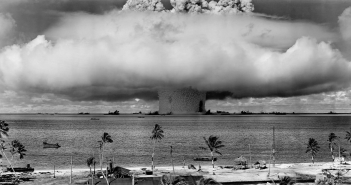In Plato’s dialogue ‘Cratylus,’ Socrates and his friends Cratylus and Hermogenes discuss the issue of how phenomena are named. At the heart of the discussion lies the question of whether names have a natural relationship with the things they signify; or is this a random exercise, determined by custom, and are these names therefore mutable? So could the name ‘table’ simply be adjusted to ‘elbat’ by government decree?
Many years ago I listened to the legendary publisher John Calder (of Calder and Boyars) at an afternoon session in Dublin’s Abbey Theatre. By that time he had published approximately fifteen Nobel Prize winning authors, including Samuel Beckett. He mused on how fifteen years had passed since the first of Beckett’s publications and his rise to becoming ‘a household name,’ after winning the Nobel Prize for literature in 1969. Ideas are not grasped overnight, they take time, John Calder observed.
Socrates, Cratylus and Hermogenes might well stand a better chance of grasping the nature of the current pandemic than many contemporaries, as many of the main terms in use are of Greek origin.
Epidemic: from Greek ἐπί epi ‘upon or above’ and δῆμος demos ‘people.’
Pandemic: from Greek πᾶν, pan, ‘all’ and δῆμος, demos, ‘people.’
Equally important terms derive from Latin:
Virus: from Latin ‘poison, slime, venom.’
Vaccine: from the Lain ‘vacca,’ meaning cow, a named conferred by Louis Pasteur in honour of Edward Jenner who pioneered the concept by using cowpox to inoculate (mid-15c., ‘implant a bud into a plant,’ from Latin inoculatus, past participle of inoculare ‘graft in, implant a bud or eye of one plant into another,’) against smallpox.
Exponential: from Latin exponere ‘put forth.’
At another point in their discussion the philosophers look up at the sky. They point to various planets and speak their names. Then one says: ‘There are things up there which do not have a name.’
And another adds: ‘There are things down here which do not have a name.’ This brings to mind a disturbing thought, which is that if all things in the universe are related, and some things do not have a name, can the system of naming be relied upon?
Take the proposition that someone, anyone, may carry the virus but show no symptoms. That, I believe, is a novel idea. One which did not have a specific name, in common parlance anyway.
At least one eminent virologist has dismissed the claim outright that a ‘healthy-sick’ individual can pass on the virus as a ‘crowning of stupidity,’ when he explained ‘Why Everyone Was Wrong’ in their initial assessment of Covid-19. No doubt other experts hold differing views, but we are clearly in new linguistic territory when ‘asymptomatics’ are suffering from (or is that experiencing?) a disease.
A few days ago I observed a group of teenagers, aged around twelve or thirteen, pushing, shoving, hugging, flirting, shouting, laughing, jumping, dancing, and even kissing around the Triangle in Ranelagh in Dublin.
I doubt any of them are as yet familiar with the Classical etymology of important medical terms, or the nomenclature around ‘the virus’ now in circulation. If they knew what the Covid-19 restrictions are at all, they were blatantly flouting them with the enthusiasm of a Republican at a White House garden party.
Perhaps instinctively they knew they had little or nothing to be concerned about themselves. A report in the Wall Street Journal in May quoted the U.S. Center or Disease Control to the effect that since February only fifteen children under the age of fifteen in the U.S. had died of Covid-19, compared to about two hundred who had died of flu and pneumonia. I just hope their instinct to embrace the fullness of life will not betray any older relatives who might be more susceptible.
At another point in Plato’s dialogue a row breaks out between Cratylus and Hermogenes. Cratylus tells Hermogenes that ‘Hermogenes’ is not actually his name. This infuriates Hermogenes. It is so his name. His name is Level 3, not level 5! Level 3, Hermogenes! As Leo Varadkar might have said to Tony Holohan.
Feature Image: The Death of Socrates (1787), by Jacques-Louis David.




